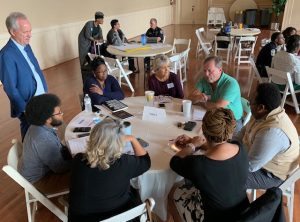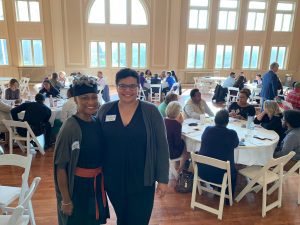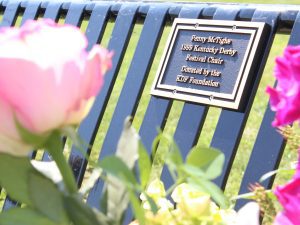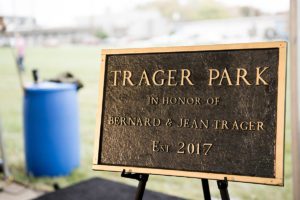Kosair Charities and Spalding University announced Tuesday the 20 individuals who will make up the 2021 cohort of the Kosair Charities Leadership Development Institute, a yearlong interactive program at Spalding for leaders of area nonprofit organizations. The institute, which is in its second year, aims to improve and enhance already high-performing nonprofits that are dedicated to supporting children and families.
The second class of the Kosair Charities Leadership Development Institute (LDI) includes executive directors and senior leaders from a range of nonprofit organizations, with some of them among the more than 80 organizations that have received philanthropic support from Kosair Charities. Spalding’s Kosair Charities Leadership Development Institute is believed to be a one-of-a-kind partnership in the region between a university and a philanthropic organization to provide broad professional development to leaders in the social impact sector.
Beginning in January, the new Kosair Charities LDI cohort will collaborate with others during a year of professional development and executive coaching from an array of Spalding faculty, staff and community partners in all facets of organizational development and leadership.
“We are excited to continue our unique partnership with Spalding University for a second year in order to equip even more of our area’s most outstanding nonprofit leaders with evidence-based tools and valuable skills that will help sustain and advance their organizations, whose services and advocacy are vital to our community’s well-being,” Kosair Charities President Keith Inman said.
“By the end of 2021, more than three dozen organizations will have leaders who have completed this high-level professional development and coaching from Spalding’s expert faculty and staff. This LDI class is a diverse, dynamic group of leaders who are providing a range of educational, health care, cultural and support services that will help children and families reach their full potential. The institute will help them learn how to perform their important work at a higher level.”
The group will primarily meet virtually for the duration of the pandemic, participating in workshops, projects and executive coaching by nationally certified coaches, covering concepts similar to those of a graduate-level academic program. Topics will include emotional intelligence leadership, financial and strategic management, fundraising, marketing and public relations, organizational culture and team-building, and ethical leadership. Throughout the course, the curriculum will weave in social justice concepts.
“I am honored to be selected as a Kosair Charities LDI participant,” said Marland Cole, one of the new cohort members who serves as Executive Director of Evolve502. “I am looking forward to gaining new tools and perspectives that will enable me to grow in my leadership role. I also appreciate the opportunity to build a network of relationships with other nonprofit thought leaders who share similar experiences and challenges.”
Nearly 20 Spalding faculty, staff and community partners, including Spalding President Tori Murden McClure and Kosair Charities’ Inman, will serve as workshop presenters and coaches for the LDI.
Dr. Joanne Berryman, who retired in 2019 as Spalding’s Provost and is a former Senior Vice President for Jewish Hospital and a former CEO of Frazier Rehab Institute, serves as the university’s Kosair Charities LDI Program Director. Berryman is also a certified Gallup Strengths-Based Leadership Coach and is certified by Multi-Health Systems and Genos Inc. as an Emotional Intelligence Coach.
Spalding’s Kosair Charities Leadership Development Institute 2021 Cohort Roster
“Spalding University is proud to partner with Kosair Charities to continue providing this high-level training to nonprofit leaders who are doing some of the most meaningful work in our community, and our involvement aligns perfectly with the Spalding mission,” McClure said. “As a small, compassionate university dedicated to peace, justice and service – and as a nonprofit organization, itself, made up of experienced nonprofit leaders – Spalding is well-suited to deliver this type of comprehensive training and coaching. We can’t wait to get started with the second cohort!”
- Stacy Bailey-Ndiaye, Executive Director, Bridge Kids International
- Karina Barillas, Executive Director, La Casita Center
- Kaitlin Blessitt, Executive Director, Marty’s Orchid House
- Marland Cole, Executive Director, Evolve502
- Megan Cooper, Executive Director, Camp Hendon
- Arthur Cox, Executive Director, St. George’s Scholar Institute
- Jennie Jean Davidson, Executive Director, Neighborhood House
- Emilie Dyer, Program Director, Americana World Community Center
- Edwin Fox, Tutoring Program Coordinator, First Gethsemane Center for Family Development
- Tanisha “Tish” Frederick, Founder, BAYA
- Sonja Grey, Executive Director, ECHO
- Sarah Halfacre, Executive Director, Green Hill Therapy
- Joe McCombs, Director of Operations, enTECH at Spalding Univ.
- Kathy Mullen, Director of Education, VIPS Louisville
- Christina Poole, Founder/President, City Schoolhouse
- Kish Cumi Price, Director of Education Policy and Programming, Louisville Urban League
- Katherine Six, Executive Director, Educational Justice
- David Weathersby, Chief Operating Officer, Seven Counties Services
- Patricia Williams, President and CEO, Wesley House Community Services
- Lori Wilson, Executive Director, Carriage House Educational Services



